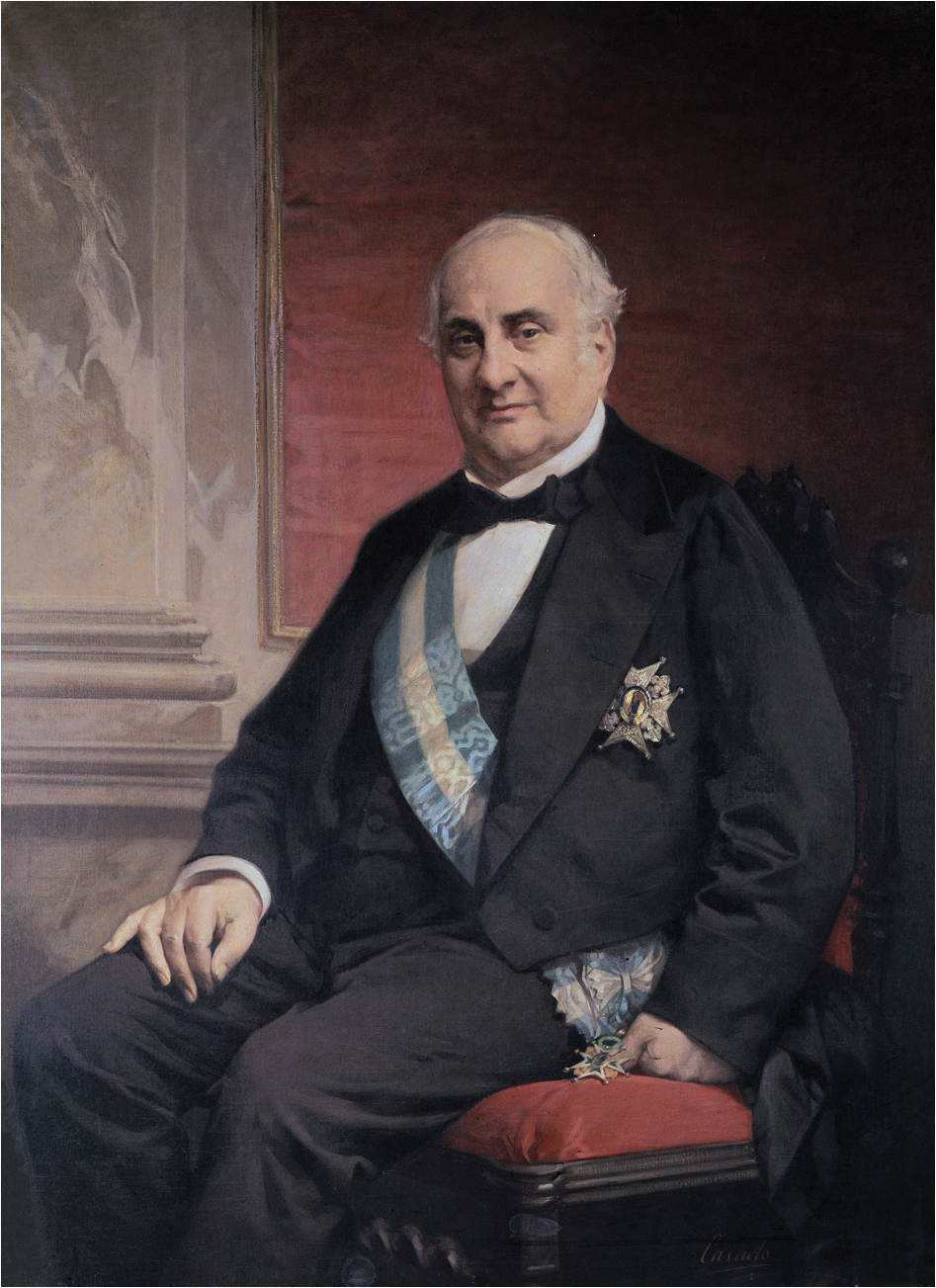|
Ramón De Santillán
Ramón de Santillán González (30 August 1791 – October 19, 1863) was a Spanish statesman who served as Minister of Finance and First Governor of the Bank of Spain. Life Santillán was born in Lerma (province of Burgos). He came from a relatively poor family. He matriculated in law at the University of Valladolid in 1805; his studies were interrupted by the Peninsular War.José Ramón de SantillánEl Levantamiento y la Guerra de la Independencia en la provincia de Burgos ''Revista Arbil'' nº 65. ISSN 1697-1388. Retrieved 2010-03-03. He enlisted in 1809 as a corporalRamón Santillán González Base documental d'Història Contemporània de Catalunya. Retrieved 2010-03-03. in the army led by the priest |
Minority Of Isabella II Of Spain
Isabella II of Spain (10 October 1830 – 9 April 1904) was barely three years of age when her father Ferdinand VII of Spain died on 29 September 1833. Her minority age was marked first by the regency of her mother Maria Christina of the Two Sicilles and then under General Baldomero Espartero, covering almost ten years of her reign, until 23 July 1843, when Isabella was declared to be of age. Upon the death of Ferdinand VII, his wife Maria Christina immediately assumed the regency on behalf of her daughter Isabella II, and promised the liberals a policy different from that of the deceased king. Part of the Spanish society was expectant before a possible change in the future reign of Isabella II, and that would incorporate to the country the liberal models that were developed in some nations of Europe. The First Carlist War and the confrontations between the liberals of the Moderate Party and those of the Progressive Party culminated in the rise to the head of state of General E ... [...More Info...] [...Related Items...] OR: [Wikipedia] [Google] [Baidu] |
Bank Of Isabella II
The Bank of Isabella II ( es, Banco de Isabel II) was a financial institution in Spain, created by a Royal Decree of 25 January 1844Teodora Gómez Herrero, ''Diccionario-guía legislativo español: comprende todas las disposiciones legales que se han publicado durante el presente siglo xix, presentadas dentro de un orden y clasificación por artículos, de tal forma enunciados...'', Volume 1, Part 1, R. Fé, 1902. p. 172Available onlineat Google Books. as a bank that, together with the Bank of San Fernando, began the process of establishing a Spanish banking apparatus adequate for industrialization and the transformation from feudalism to capitalism. Although not officially a bank of issue, it issued bond (finance), bonds that "were banknotes in all but name."Gabriel Tortella, "Spanish Banking History, 1782 to the Present" 865:874 in Manfred Pohl, Sabine Freitag, European Association for Banking History, ''Handbook on the history of European banks'', Elgar Original Reference Series, E ... [...More Info...] [...Related Items...] OR: [Wikipedia] [Google] [Baidu] |
Bank Of San Fernando
The Bank of San Fernando ( es, Banco de San Fernando or ''Banco Español de San Fernando'') was a financial institution created in Spain in 1829Gabriel Tortella, "Spanish Banking History, 1782 to the Present" 865:874 in Manfred Pohl, Sabine Freitag, European Association for Banking History, ''Handbook on the history of European banks'', Elgar Original Reference Series, Edward Elgar Publishing, 1994, . p. 865–866Availableon Google Books. at the initiative of Finance Minister Luis López Ballesteros, replacing the old Bank of San Carlos.Brief History , Banco de España. Retrieved 2010-03-04. It assumed the debt of the Bank of San Carlos and increased its capital by replacing an uncollectable 77.4 million peseta go ... [...More Info...] [...Related Items...] OR: [Wikipedia] [Google] [Baidu] |
Senator For Life
A senator for life is a member of the senate or equivalent upper chamber of a legislature who has life tenure. , six Italian senators out of 206, two out of the 41 Burundian senators, one Congolese senator out of 109, and all members of the British House of Lords (apart from the 26 Lords Spiritual who are expected to retire at the age of 70) have lifetime tenure (although Lords can choose to resign or retire or can be expelled in cases of misconduct). Several South American countries once granted lifetime membership to former presidents but have since abolished the practice. Burundi In Burundi, former presidents of the Republic serve in the Senate for life. At present there are two of these: Sylvestre Ntibantunganya and Domitien Ndayizeye. Democratic Republic of the Congo The 2006 constitution of the Democratic Republic of the Congo grants lifetime membership in the Senate to former presidents of the Republic. As of 2019, Joseph Kabila is the only senator for life afte ... [...More Info...] [...Related Items...] OR: [Wikipedia] [Google] [Baidu] |
Spanish Tax Reform Of 1845
The Spanish tax reform of 1845, approved in 1844, greatly changed the tax system of Spain. It established the basis for a system that continues to this day. Background In the summer of 1843, a military coup led by the Moderate generals Francisco Serrano, Ramón María Narváez and Juan Prim removed the Progressive leader Baldomero Espartero from his position as regent, ending a three-year Progressive ascendancy. Queen Isabella II, who had just reached the age of 13, was declared to have reached the age of majority, ending the regency. Within a year, that led to the beginning of the ''década moderada'', ten years of rule by the Moderates. Reform The executive council that came to power in 1844 was presided over by Narváez. It undertook a tax reform, proposed by a commission whose key figure was the brilliant but logical and orderly Ramón de Santillán. It was carried out by Finance Minister Alejandro Mon. The reform broke the tax system of '' Antiguo Régimen'' and estab ... [...More Info...] [...Related Items...] OR: [Wikipedia] [Google] [Baidu] |
Pita Pizarro
Pita ( or ) or pitta ( British English), is a family of yeast-leavened round flatbreads baked from wheat flour, common in the Mediterranean, Middle East, and neighboring areas. It includes the widely known version with an interior pocket, also known as Arabic bread ( ar, خبز عربي; ''khubz ʿarabī''). In the United Kingdom, Greek bread is used for pocket versions such as the Greek pita, and are used for barbecues to a souvlaki wrap. The Western name ''pita'' may sometimes be used to refer to various other types of flatbreads that have different names in their local languages, such as numerous styles of Arab ''khubz'' (bread). History Pita has roots in the prehistoric flatbreads of the Middle East. There is evidence from about 14,500 years ago, during the Stone Age, that the Natufian people in what is now Jordan made a kind of flatbread from wild cereal grains. Ancient wheat and barley were among the earliest domesticated crops in the Neolithic period of about ... [...More Info...] [...Related Items...] OR: [Wikipedia] [Google] [Baidu] |
Alejandro Mon Y Menéndez
Alejandro Mon y Menéndez (26 February 1801 in Oviedo, Principality of Asturias, Spain – 1 November 1882) was a Spanish politician and jurist who was prime minister of Spain in 1864, during the reign of Queen Isabella II. Early life Mon was born in Oviedo and was the eldest son of Miguel Mon y Miranda and Francisca Menéndez y de la Torre. His only sister, Manuela, was married to the Asturian Pedro José Pidal, 1st Marquis of Pidal, another prominent politician who served several times as prime minister. He studied law in the University of Oviedo, where he became interested in politics and approached the Moderate Party. Political career In the regency of Queen Maria Christina of the Two Sicilies (1833–1840), Mon was appointed for his first high political office, minister of finance from 1837 to 1838, in a moderate cabinet headed by Narciso Fernández de Heredia, 2nd Count of Heredia-Spínola. During the regency of the progressivist Baldomero Espartero (1840–1843), ... [...More Info...] [...Related Items...] OR: [Wikipedia] [Google] [Baidu] |
Juan José García Carrasco Romero
''Juan'' is a given name, the Spanish and Manx versions of '' John''. It is very common in Spain and in other Spanish-speaking communities around the world and in the Philippines, and also (pronounced differently) in the Isle of Man. In Spanish, the diminutive form (equivalent to ''Johnny'') is , with feminine form (comparable to ''Jane'', ''Joan'', or ''Joanna'') , and feminine diminutive (equivalent to ''Janet'', ''Janey'', ''Joanie'', etc.). Chinese terms * ( or 娟, 隽) 'beautiful, graceful' is a common given name for Chinese women. * () The Chinese character 卷, which in Mandarin is almost homophonic with the characters for the female name, is a division of a traditional Chinese manuscript or book and can be translated as 'fascicle', 'scroll', 'chapter', or 'volume'. Notable people * Juan (footballer, born 1979), Brazilian footballer * Juan (footballer, born 1982), Brazilian footballer * Juan (footballer, born March 2002), Brazilian footballer * Juan (footbal ... [...More Info...] [...Related Items...] OR: [Wikipedia] [Google] [Baidu] |
Moderate Party (Spain)
The Moderate Party ( es, Partido Moderado) or Moderate Liberal Party ( es, Partido Liberal Moderado) was one of the two Spanish political parties that contended for power during the reign of Isabel II (reigned 1833–1868). Like the opposing Progressive Party ( es, Partido Progresista), it characterised itself as liberal and dynasticist; both parties supported Isabel against the claims of the Carlists. The Moderates contained various factions. Some supported working with Progressives, but others sought closer ties with the Old Regime. However, the party's dominant ideology was adherence to the centrist ''juste milieu'' of the French Doctrinaires. Trajectory The "moderates" or "liberal moderates" were a continuation of the ''doceañistas'', supporters of the Spanish Constitution of 1812 during the '' Trienio Liberal'' ("liberal triennium") of 1820–1823, as opposed to the more radical ''exaltados'' or ''veinteañistas''. In the last years of the reign of Ferdinand VII they ... [...More Info...] [...Related Items...] OR: [Wikipedia] [Google] [Baidu] |
Pedro Surrá Y Rull
Pedro is a masculine given name. Pedro is the Spanish, Portuguese, and Galician name for '' Peter''. Its French equivalent is Pierre while its English and Germanic form is Peter. The counterpart patronymic surname of the name Pedro, meaning "son of Peter" (compare with the English surname Peterson) is Pérez in Spanish, and Peres in Galician and Portuguese, Pires also in Portuguese, and Peiris in coastal area of Sri Lanka (where it originated from the Portuguese version), with all ultimately meaning "son of Pêro". The name Pedro is derived via the Latin word "petra", from the Greek word "η πέτρα" meaning "stone, rock". The name Peter itself is a translation of the Aramaic ''Kephas'' or '' Cephas'' meaning "stone". An alternate archaic spelling is ''Pêro''. Pedro may refer to: Notable people Monarchs, mononymously *Pedro I of Portugal *Pedro II of Portugal *Pedro III of Portugal *Pedro IV of Portugal, also Pedro I of Brazil * Pedro V of Portugal *Pedro II ... [...More Info...] [...Related Items...] OR: [Wikipedia] [Google] [Baidu] |
Agustín Fernández Gamboa
Agustín is a Spanish given name and sometimes a surname. It is related to Augustín. People with the name include: Given name * Agustín (footballer), Spanish footballer * Agustín Calleri (born 1976), Argentine tennis player * Agustín Cárdenas (1927–2001), Afro-Cuban sculptor * Agustín de Iturbide (1783–1824), First Emperor of Mexico * Agustín de Rojas Villandrando (1572–1618), Spanish writer and actor * Agustín Fiorilli (born 1978), Argentine swimmer * Agustín Jerónimo de Iturbide y Huarte (1807–1866), Prince Imperial of Mexico * Agustín Pedro Justo (1876–1943), former President of Argentina. * Agustín Lara, renowned Mexican musician * Agustín Moreno (born 1967), former tennis player * Agustín Muñoz Grandes (1896–1970), Spanish general and politician * Agustin Olvera (died 1876), pioneer of Los Angeles, California * Agustín Pichot (born 1974), Argentine Rugby union player * Agustin Presinger (1869–1934) German bishop and missionary * Agust� ... [...More Info...] [...Related Items...] OR: [Wikipedia] [Google] [Baidu] |

.jpg)

